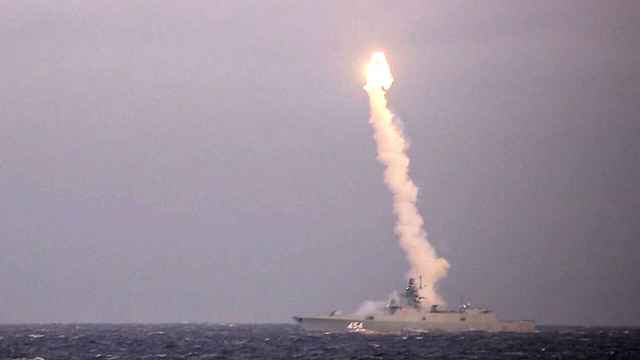Russia warned Thursday it could “hit targets” as well as fire warning shots following a disputed military encounter with a British warship near the coast of annexed Crimea.
The Russian military said its aircraft dropped bombs in the vessel's path and border guard ships fired warning shots after the Royal Navy’s HMS Defender crossed into Russian territorial waters in the Black Sea on Wednesday. London denied that any warning shots were fired and said its destroyer was passing through an internationally recognized shipping lane.
“What can we do? We can appeal to common sense, and demand respect for international law,” the state-run TASS news agency quoted Deputy Foreign Minister Sergei Ryabkov as saying.
“If that doesn’t work, we can bomb not only the path but also the target, if our colleagues don’t understand,” Ryabkov said.
The Kremlin accused Britain of provoking the incident and did not rule out the possibility of Ryabkov’s warning.
“If they go too far, you can’t rule out any options in protecting Russian borders,” President Vladimir Putin’s spokesman Dmitry Peskov was quoted as saying.
Video published by a BBC correspondent on board the HMS Defender, which passed Crimea on its way from the Ukrainian port of Odessa to Georgia, showed the tense encounter with Russian warplanes and vessels.
“If you don’t change course, I’ll fire,” a Russian voice can be heard saying over the radio. The British Defense Ministry said in an earlier statement that it believes that Russia was conducting a “gunnery exercise” it had warned the maritime community about.
The BBC footage also showed several rounds fired at a distance in what its correspondent said was “well out of range” of the ship. The reporter said he witnessed a total of 20 Russian military aircraft buzzing the HMS Defender.
Russia’s Foreign Ministry, which summoned Britain’s defense attache in Moscow on the day of the incident, said Thursday it planned to summon Britain’s ambassador to issue a “strong demarche.”
Border incidents involving Russian and Western militaries are not uncommon but they rarely result in open fire.
Tensions escalated for several weeks this spring after Russia built up troops in Crimea and near Ukraine's eastern borders, and carried out exercises in the Black Sea as the United States warned it would send two warships.
Tensions eased after the U.S. ships were not dispatched and Russia withdrew some of its troops.
A Message from The Moscow Times:
Dear readers,
We are facing unprecedented challenges. Russia's Prosecutor General's Office has designated The Moscow Times as an "undesirable" organization, criminalizing our work and putting our staff at risk of prosecution. This follows our earlier unjust labeling as a "foreign agent."
These actions are direct attempts to silence independent journalism in Russia. The authorities claim our work "discredits the decisions of the Russian leadership." We see things differently: we strive to provide accurate, unbiased reporting on Russia.
We, the journalists of The Moscow Times, refuse to be silenced. But to continue our work, we need your help.
Your support, no matter how small, makes a world of difference. If you can, please support us monthly starting from just $2. It's quick to set up, and every contribution makes a significant impact.
By supporting The Moscow Times, you're defending open, independent journalism in the face of repression. Thank you for standing with us.
Remind me later.






